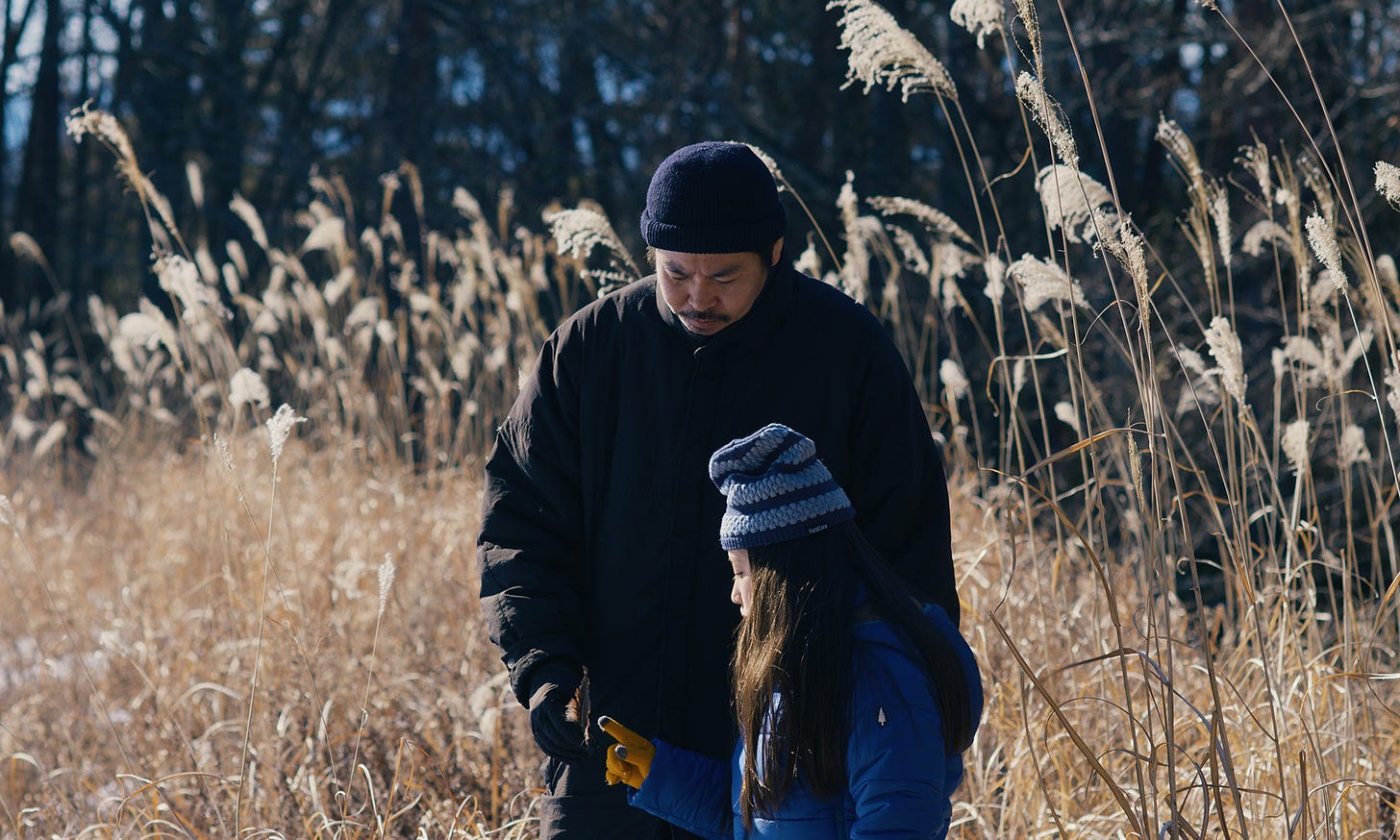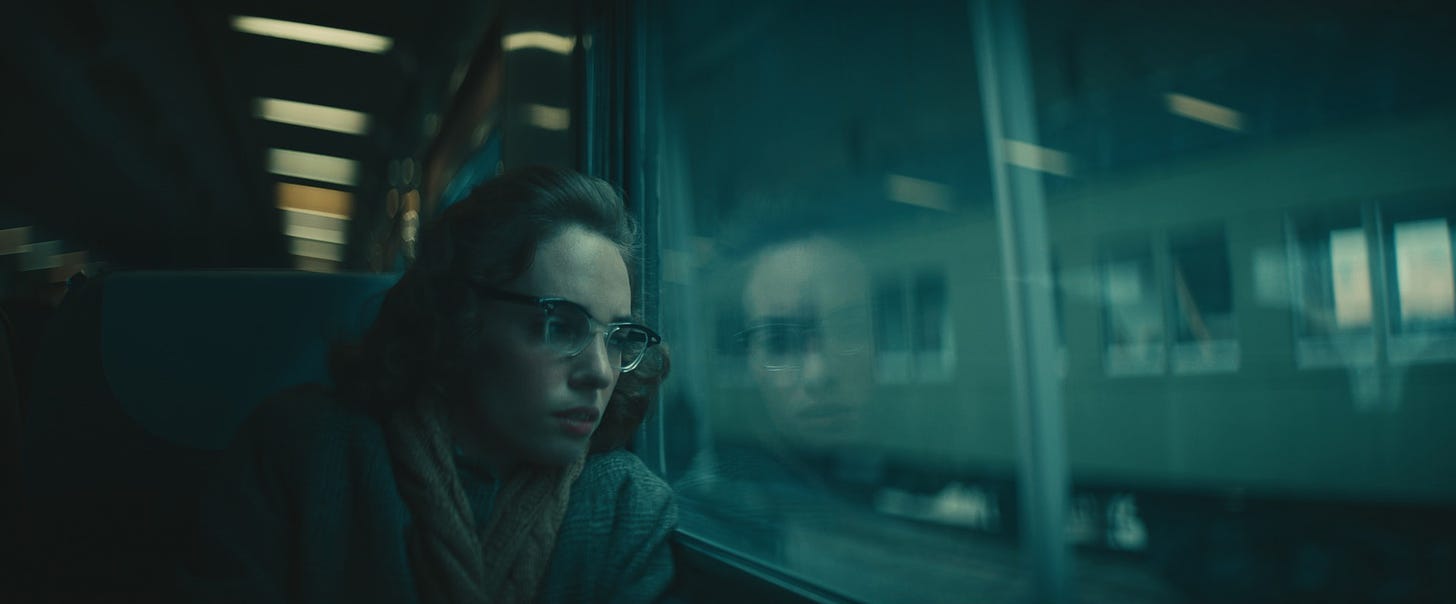I can’t say it’s been a great year for movie posters so far—where it comes to my Posterized column at The Film Stage. The first four months had me struggling to find a ninth entry I wanted to talk about (if not eighth and/or seventh). So, it was a joy to find myself having to omit some good ones in May.
Here’s a glimpse at three favorites (the feature goes live sometime this morning):
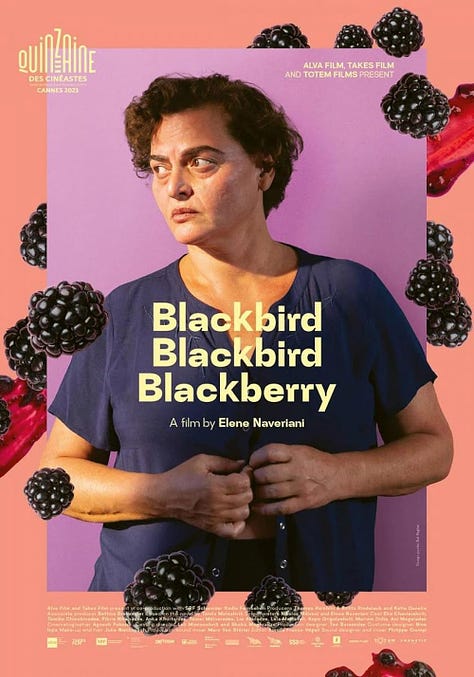
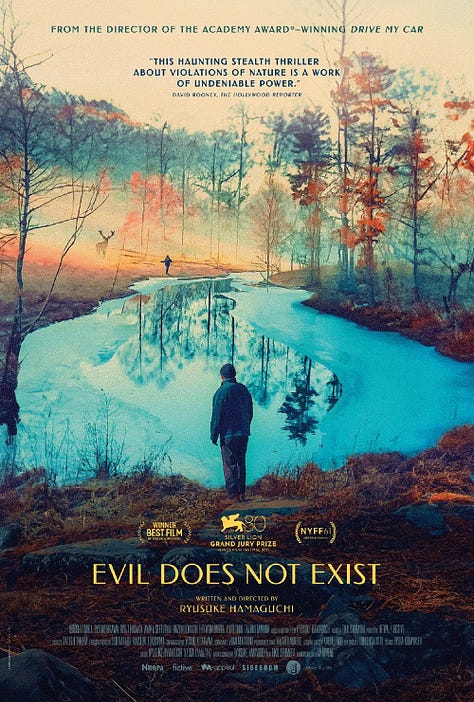
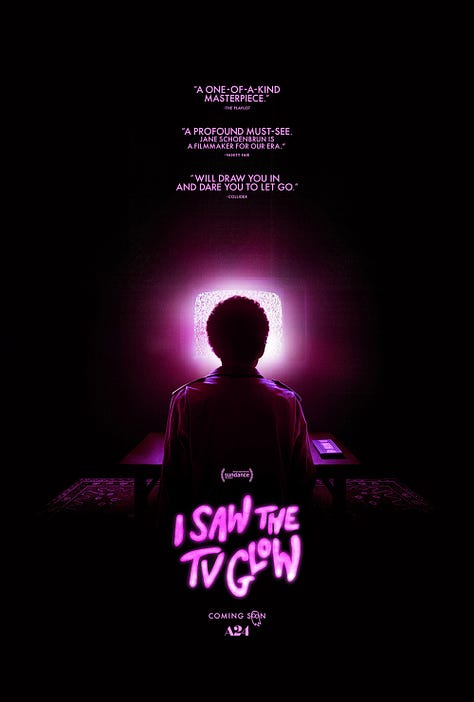
Which isn’t to say the posters released this year aren’t up to snuff. My column deals with posters for movies releasing in the US that month rather than those that debuted regardless of the film’s timeline. Some of these things drop online a full year in advance (sometimes more if production trouble and cold feet delay things). Some months after in the case of fan-made work.
Here’s Aleksander Walijewski’s THE ZONE OF INTEREST, Célie Cadieux’s A THOUSAND CUTS, and Vasilis Marmatakis’ KINDS OF KINDNESS:
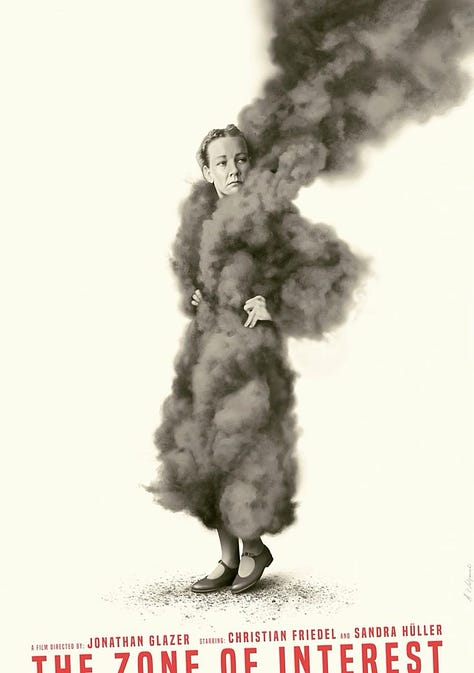
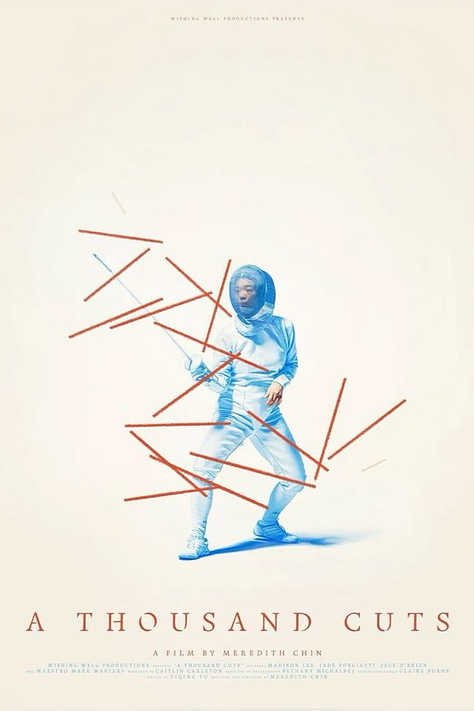
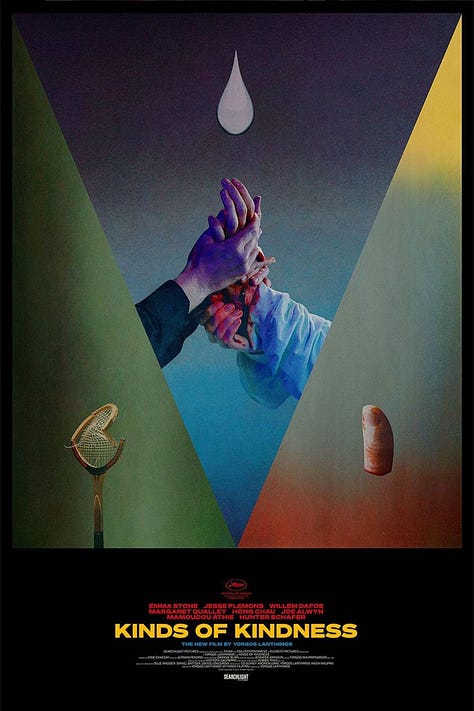
I often feel like I’m the Grammy’s doing this feature because the dates are all messed up. So, whenever someone complains I omitted something (because the film isn’t out yet) or included something that came out the year before (because the film is finally out), I just explain that having a rule and sticking to it keeps me sane and on-task regardless of whether it also means frustrating them.
What I Watched:
EVIL DOES NOT EXIST
[Aku wa sonzai shinai]
(limited release)
Started as a collaboration between Ryûsuke Hamaguchi and composer Eiko Ishibashi, EVIL DOES NOT EXIST is as much a standalone work as it is a companion piece. GIFT is the original: a live performance of Ishibashi’s music played against a silent film Hamaguchi built from the footage (mostly alternate takes) that he then filled out for this feature. He speaks about asking Ishibashi’s permission as a result since he was ultimately the hired hand now seeking to create something new. She agreed and inevitably supplied the score.
The narrative concerns itself with its characters more than plot. Set in Mizubiki Village, near Tokyo, we meet Takumi (Hitoshi Omika, a crewmember on WHEEL OF FORTUNE AND FANTASY) as he goes about his usual day of chopping wood and collecting large jugs of fresh spring water to provide to his fellow villagers upstream. He’s a nature expert who teaches his daughter Hana (Ryo Nishikawa) about the trees and animals to the point where she often wanders off after daycare to explore the forest on her way home alone. The community is tight-knit and collaborative, helping each other preserve the beauty and sanctity of this land.
Enter Takahashi (Ryuji Kosaka) and Mayuzumi (Ayaka Shibutani)—employees of a talent agency pursuing a post-COVID government subsidy by proposing to build a glamping site in Mizubiki so city folk have a quietly serene place to unwind and escape their lives (in other words, pay to do whatever they want before going back home, leaving their waste and pollution behind). Obviously a scheme to collect fast cash, these representatives (both admittedly assigned the job of holding court with the village rather than actually qualified for it) meet a well-versed and very proactive group ready to explain how poorly planned their project is and how devastating it proves to Mizubiki’s survival.
Hamaguchi isn’t one to blindly devolve things into “good vs bad” regardless of his characterizations making it easy to choose who should fall in each category. He instead presents them as opposing forces with the potential for common ground against a wholly different entity: Mother Nature. Whereas the talent agency sees this land as an untapped resource to be torn up and repurposed for profit, the village knows it as a place worth preserving. Not only that, however, they know that any fight they might possess to protect their water source from this project’s insufficient septic system pales in comparison to the fight the land and animals will put forth to defend themselves from mankind’s greed.
That is where the title enters. Much like Takumi’s description of wild deer being docile and thus not a threat (despite the glamping site targeting a deer trail for construction), evil does not inherently live within the hearts of God’s creatures ... unless. The word lingers in the air before he tells Takahashi and Mayuzumi that all bets are off if that creature feels threatened or finds itself injured and unable to flee. If you back that shy animal into a corner, it will fight back. Not for vengeance or violence, but to survive. And human beings are no different. They will try to be civil. They will try to educate outsiders about the error of their ways. But, push comes to shove, they’ll use force to protect their own.
It leads to a surprising yet authentic final scene—a contrasting bookend of foreboding horror opposite Hana’s bright snowy walk in the opening. Hamaguchi sprinkles bits and pieces throughout the runtime to prepare us for this eventual collision between security and helplessness whether Hana constantly roaming into the forest by herself or the distant sounds of gunshots. The village false assumes harmony can be preserved despite the constant threat of external forces because, as Takumi admits earlier on, this community is still young. They’re all outsiders doing their best to find balance. In the end, nature will take matters into its own hands and its victims might not always be those who deserve it.
- 8/10
FALLOUT: Season 1
(streaming on Prime)
It shouldn’t be a surprise to see Jonathan Nolan and Lisa Joy’s names attached to the series adaptation of FALLOUT. They aren’t its creators like they were on WESTWORLD, but they are executive producers with Nolan directing the first three episodes. The similarities are obvious, though. Geneva Robertson-Dworet and Graham Wagner—the showrunners—have crafted a narrative that can’t help but recall WESTWORLD’s own first season of “awakening.” Because while Lucy MacLean (Ella Purnell) and Maximus (Aaron Moten) aren’t androids, they aren’t quite fully human either. No one that naive could be.
Set at the end of the world, the plot takes on a three-pronged attack … and let me preface things by saying I know absolutely nothing about the video game or how much of what’s on-screen is cribbed directly from that franchise or built atop its scaffolding. All three are unique yet still ultimately set upon the same course: finding the so-called “target” (Michael Emerson) and procuring the artifact in his possession. An artifact that can change the world.
Prong One: the Vaults. This is where Lucy grew up. A hermetically sealed institution meant to sustain life for centuries after atomic extinction so they may one day repopulate the earth.
Prong Two: the Brotherhood. This is where Maximus grew up. A sort of militarized religion (which, taking the Crusades into consideration, is a redundant descriptor) seeking to control the Wastelands and bring order under its sole domain.
Prong Three: the Wastelands. This is where The Ghoul (Walton Goggins) was born even if it isn’t where the man he once was hails from. As we gradually discover from flashbacks, Cooper Howard was an actor, a shill, and a husband who tragically discovers the truth too late.
The Ghoul is the only one of this trio who has his eyes fully open to what the world has become as a result. He’s a bounty hunter who’s lived the past two hundred years on a cocktail of aerosolized radiation that keeps him immortal as long as he has enough bottle caps to ensure his meds stay replenished. He enjoys killing. He enjoys surviving. And he has his reasons for staying alive this long.
Lucy and Maximus are conversely lambs being led to slaughter. Raised by indoctrination, they inevitably through opposite motivations. He has been waiting his whole life to go out into the wilds and prove his might to one-day don the mech-like armor of a knight. She has devoted her own to never experiencing the real world until the time to build it anew arrived. Unfortunately, the abduction of her father (Kyle MacLachlan’s Hank) by the infamous Moldaver (Sarita Choudhury) accelerates that timeline. Neither therefore knows what awaits. Neither is prepared for the Hell they’ve entered. But both are more than up to the task.
The season is thus an exposition dump in many ways. With the first episode being entitled “The End” and the last “The Beginning”, this realization shouldn’t be shocking. We’re experiencing the present through the eyes of not-so-innocent-anymore innocents (Lucy and Maximus) while learning about the past through the memories of a grizzled vet (The Ghoul). Many characters inexplicably populate both, the hows and whys soon to be discovered once this trio converge at their common rendezvous point and Lucy’s brother (Moises Arias’ Norm) fulfills his own detective mission inside the insulated yet maliciously secretive vaults.
And we get to know them along the way. Who they think they are as a result of where they reside and what they’ve been told as well as who they allow themselves to become as a result of the reality their quest provides. The adventure leads them into fights with monsters and non-humans alike (these things always prove how we’re the real monsters and destroyers of worlds), comedic exchanges (Dale Dickey, Fred Armisen, Chris Parnell, Mat Berry, and others make appearances for color and gags), and mythology lessons as far as whose sense of the timeline is correct (if any). In the end, this is as much an exposition dump for the characters as it is for us considering everything they’ve ever known is a lie.
I liked Purnell and Moten a lot. They exude bright-eyed wonder and childish frustration perfectly—stunted kids in adult bodies finding clarity for the first time. The supporting cast is a delight, the production value is top-notch (save a very bad attempt at de-aging during the finale), and the scripts equally informative and entertaining as far as endearing us to the heroes and getting a lay of the land. But the real highlight (as he often is, ever since his THE SHIELD days) is Goggins. Not just because he’s an effectively sardonic badass Ghoul, but also because he’s an effectively human Cooper trying to reconcile the blind patriotism of a war veteran with the empathetic, “traitorous” heart of hero.
Lucy asking The Ghoul who he is only for him to respond by saying, “I’m you.” is all you really need to know about what FALLOUT seeks to do with its wall-to-wall paralleling. This world, much like our own, has watched its tribalism fracture the very fabric of mankind into cruel, deceitful pieces. And only the product of that cruelty can hope to stop it. Not by changing the minds of those they love, but by acknowledging that those they love have been their enemy the whole time.
- 8/10
WILDCAT
(limited release)
Similar to his previous directorial effort BLAZE, Ethan Hawke approaches his biopic WILDCAT from an angle that allows co-writer Shelby Gaines and him to bring Flannery O’Connor to life through the work as well as the person. He’s using the art as a means to understand the artist, shifting between reality (daughter Maya Hawke’s Flannery returning home to Georgia just prior to discovering she has the same form of lupus that killed her father years ago) and fiction (stories of comeuppance, cynicism, and dark humor). There’s Flannery and her mother (Laura Linney’s Regina) arguing about faith and decorum while her characters act out similar grievances upon the page.
Both Maya and Linney play their respective counterparts in each literary iteration brought to life from O’Connor’s short stories. Sometimes they are poor farmers. Other times staunchly entrenched in the bourgeoisie. It’s the men who change faces, if not also flaws: the tramp (Steve Zahn), the drunk (Rafael Casal), and the snake (Cooper Hoffman, recalling his father’s mannerisms a lot more here than in LICORICE PIZZA). They embody Flannery’s complex relationship with God, faith, and humanity—her rejection of outlines in lieu of letting the story guide her ensures her imagination and, perhaps, contempt drives them to unforgivable ends via opportunism, self-pity, or violence.
It’s an intriguing dance between “fact” (real life is approximated through research and the writer’s own diaries) and fiction that plays with the idea that each influences the other in myriad ways. Regina encouraging a white child in church suddenly conjures a different woman’s very pointed and racially motivated interaction with a Black boy on a bus. Flannery’s troubles with love courtesy of the never fully available (emotionally or otherwise) Cal (Philip Ettinger) giving birth to the aforementioned trio of “good” men forever marked by sin and duplicity. I loved each time Hawke lets us see Flannery smiling wryly at the witty yet scathing turn of events she’s concocted.
The film does a good job introducing the writing as much as the writer as a result. Whatever WILDCAT may lack in true biography (save the two-year period depicted as scaffolding to breathe life into the words), it certainly makes up for with its many avenues towards spiritual and philosophical introspection. The real backbone here is Flannery’s existence at the border between intellectualism and religion. Her desire to find answers not through the Bible, but through the actions of those who wield it as a prop (genuinely or not, intentionally or not). What do her characters say about salvation? What about O’Connor’s unavoidable mortality?
Her experiences shape her imagination and her art inspires her choices in life. She pushes her mother away, challenges her priest (a brief cameo from Liam Neeson), and yearns for a love from someone who will never give it back. And we watch as her characters warp and twist those desires and hopes into the often disappointing yet unsurprising selfishness of a species hellbent on destroying itself through division and an ignorance towards their own complicity in it. Hence the conversation surrounding O’Connor’s own relationship with race considering the contrast between her anti-racist messaging in fiction and racist speech in letters.
Hawke doesn’t really broach this complexity much on-screen, choosing to instead lean into the anti-racist messaging by having Flannery’s literary stand-ins always admonish “Regina’s” bigotry. We don’t hear her say much on the subject at all in the real-life portions of the film besides a defense of her characters using the “n-word” as a means of honest authenticity. I don’t know how Hawke and Gaines could have put more of the idea that Flannery, like many white people, was a “recovering racist” absolving her actions through her words—a notion described at length in the press kit—on-screen, but its absence is noticeable considering everything I see online about the movie seems to mention it now.
- 7/10
Cinematic F-Bombs:
This weekend sees CHAOS THEORY (2008), DRIVING LESSONS (2006), FOR YOUR CONSIDERATION (2006), HEAD OF STATE (2003), and TRANSFORMERS: REVENGE OF THE FALLEN (2009) getting added to the archive (cinematicfbombs.com on Sunday, Twitter on Monday).
Co-writer Ali LeRoi dropping an f-bomb in HEAD OF STATE.
New Releases This Week:
(Review links where applicable)
Opening Buffalo-area theaters 5/3/24 -
AA OKKATI ADAKKU at Regal Elmwood
THE BEAST at North Park Theatre (select times)
“Seydoux is fantastic throughout, but even her performance can't help make that incel plotline feel as real or as dangerous as the [19th century Paris and present-day 2044 threads].” – Full thoughts at HHYS.
DRAGONKEEPER at Dipson Flix & Capitol
THE FALL GUY at Dipson Amherst, McKinley, Flix & Capitol; AMC Maple Ridge & Market Arcade; Regal Elmwood, Transit, Galleria & Quaker
JEANNE DU BARRY at Regal Transit, Galleria & Quaker
JOHN SINGER SARGENT: FASHION & SWAGGER at North Park Theatre (select times)
MALAYALEE FROM INDIA at Regal Elmwood
MARS EXPRESS at North Park Theatre (select times)
NADIKAR at Regal Elmwood
STAR WARS: EPISODE I - THE PHANTOM MENACE 25TH ANNIVERSARY at Dipson Flix & Capitol; AMC Maple Ridge & Market Arcade; Regal Elmwood, Transit, Galleria & Quaker
TAROT at Dipson Flix & Capitol; AMC Maple Ridge & Market Arcade; Regal Elmwood, Transit, Galleria & Quaker
THABO AND THE RHINO CASE at Regal Transit
Streaming from 5/3/24 -
DO NOT EXPECT TOO MUCH FROM THE END OF THE WORLD – MUBI on 5/3
“Less about providing answers to fix things or stop this never-ending cycle of profiteering, however, [the film] is simply looking to expose these truths alongside the double-speak and bribes of those in power.” – Full thoughts at HHYS.
PROM DATES – Hulu on 5/3
THE AMERICAN SOCIETY OF MAGICAL NEGROES – Peacock on 5/3
UNFROSTED – Netflix on 5/3
BILLY & MOLLY: AN OTTER LOVE STORY – Disney+ on 5/7
THE FINAL: ATTACK ON WEMBLEY – Netflix on 5/8
THE GUARDIAN OF THE MONARCHS – Netflix on 5/9
MOTHER OF THE BRIDE – Netflix on 5/9
Now on VOD/Digital HD -
THE ABSENCE OF EDEN (4/30)
FEMME (4/30)
“In the end, it's just about Jules taking his life back on his terms. Not by becoming that which he hates, but by turning the mirror of Preston's projection onto himself.” – Full thoughts at HHYS.
THE LONG GAME (4/30)
REMEMBERING GENE WILDER (4/30)
THEY SHOT THE PIANO PLAYER (4/30)
“The animation is great. The music is better. And the story is fascinating if only to ensure this revered yet unknown artist outside of the memories of legends doesn't become completely lost to time.” – Full thoughts at HHYS.
ARCADIAN (5/1)
“It leads to some badass moments, but very little emotion. You could pretty much say that about the entire film [...] because ARCADIAN is all set-up. [And] in that regard, the film works.” – Full thoughts at HHYS.
CATCHING FIRE: THE STORY OF ANITA PALLENBERG (5/3)
CHIEF OF STATION (5/3)
NEW LIFE (5/3)
“There's an intriguing concept here as far as using the idea that ALS is like being a prisoner in one's own body. I just think the finished product uses it as a gimmick rather than a lesson.” – Full thoughts at HHYS.
WALLED OFF (5/3)




